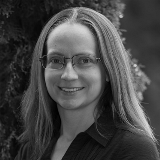
Sarah Burke-Spolaor
About
We often perceive the universe as a dark and static place, but in reality it can be truly dynamic. Sarah Burke-Spolaor studies distant phenomena in other galaxies that exhibit major changes on timescales much less than a human lifetime.
Two supermassive black holes — each a billion times the mass of our sun — can pair up during the merger of two galaxies, and orbit on timescales of days to decades. These binary black holes emit some of the brightest gravitational waves in the universe. Burke-Spolaor seeks both light and gravitational signals from such systems using a technique called “pulsar timing arrays”. This uses an array of ticking stars in our galaxy to precisely determine the movements of Earth, much like a pan-galactic GPS. Using pulsar timing arrays, her team can detect the gravitational distortions felt from those distant, orbiting, supermassive black holes.
Separately, mysterious “fast radio bursts” are millisecond-duration flashes of radio light that are coming from other galaxies, although what causes them is still unknown. They flash with such intensity that they appear to outshine their host galaxies, but only for a few milliseconds at a time. Burke-Spaolaor is working on building an observing system that can pin down the sky locations (and thus environments) of these rapid, luminous signals.
Awards
- Jansky Fellowship
- URSI Young Scientist Award
- Louis Green Prize for Astronomy Research
Relevant Publications
Law, C. J., G.C. Bower, S. Burke-Spolaor, B.J. Butler, P. Demorest, A. Halle, S. Khudikyan, T.J.W. Lazio, M. Pokorny, J. Robnett and M.P. Rupen. “realfast: Real-time, Commensal Fast Transient Surveys with the Very Large Array.” The Astrophysical Journal Supplement Series, 236, 1 (2018).
Burke-Spolaor, S., K. Gültekin, M. Postman, T.R. Lauer, J.M. Taylor, T.J.W. Lazio and L.A. Moustakas. “A Radio Relic and a Search for the Central Black Hole in the Abell 2261 Brightest Cluster Galaxy.” The Astrophysical Journal, 849, 1 (2017).
Chatterjee, S. et al. “A direct localization of a fast radio burst and its host.” Nature, 541, 7635, (2017): 58-61.
Simon, J. and S. Burke-Spolaor. “Constraints on Black Hole/Host Galaxy Co-evolution and Binary Stalling Using Pulsar Timing Arrays.” The Astrophysical Journal, 826, 1 (2016).
Burke-Spolaor, S. and K.W. Bannister. “The Galactic Position Dependence of Fast Radio Bursts and the Discovery of FRB011025.” The Astrophysical Journal, 792, 1 (2014).